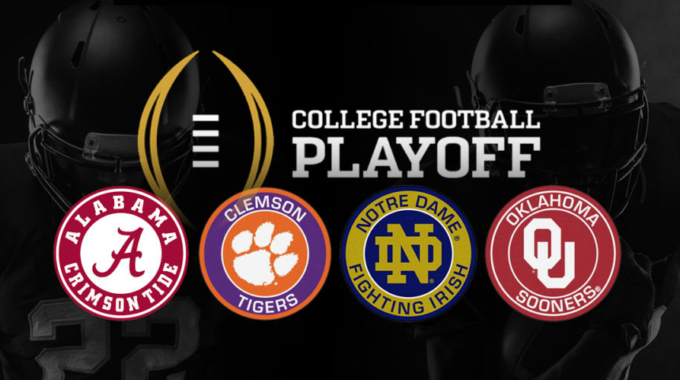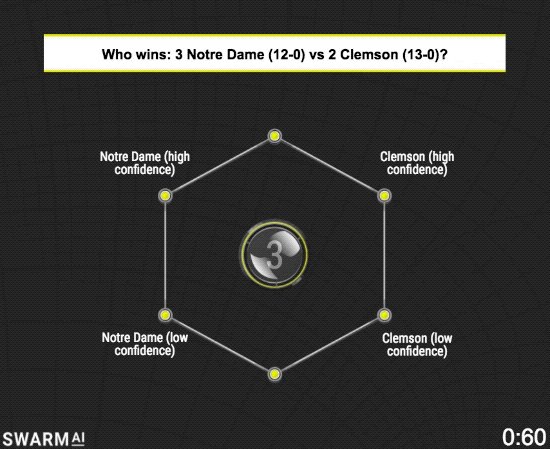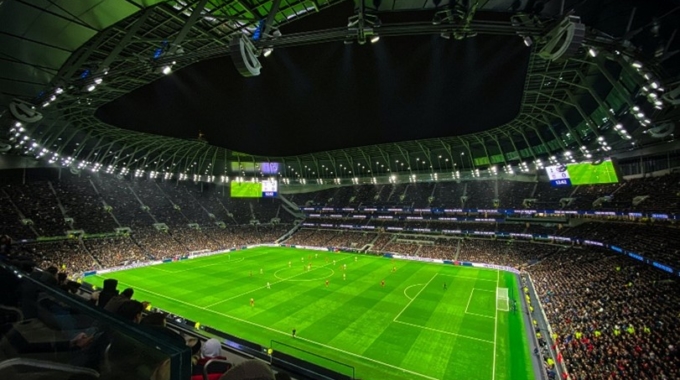
When Unanimous AI convenes a swarm of football fans and enthusiasts to make a forecast, it is almost always focused on NFL predictions. The National Football League, with its emphasis on parity, predictable schedule, and relatively small roster of teams, is a perfect testbed for Unanimous AI to challenge its Swarm AI platform. In contrast, forecasting NCAA football would require the formation of a swarm familiar with nearly 4x as many teams and navigating a schedule that sometimes features sixty-point underdogs. Those irregularities make long-term studies more challenging for college football than the NFL, and so our researchers concentrate on the professional league.
With all that said, when the postseason finally arrives, those challenges are mitigated by the high quality matchups in the major bowls. Last year, the NCAA Football Swarm went 8-2 in its forecast and beat every expert at ESPN, which supports the long-held notion that part of being a good forecaster is knowing when – and when not – to make a prediction. So, while the NCAA Swarm has a high bar to meet, Unanimous has once again rallied the troops for a set of predictions that includes every matchup of two Top 25 teams as well as the two playoff semifinal games.
As always, the swarm’s forecast is rated by confidence. This ranking is important because not all predictions are created equally, and the Swarm AI system is showing over time to be self-aware enough to understand when its insight is worthy of confidence. The potential value of this self-awareness was on full display in the most recent study from Unanimous AI, a season-long comparison of various betting strategies based on the NBA Swarm’s predictions. In short, strategies based on the Conviction Index that underlies the tiered confidence ratings showed increasingly high Returns on Investment as the strategy become increasingly selective. In other words, betting on all games was far less profitable than betting on the high confidence matchups.
On the chart above, that means that the NCAA Swarm’s highest confidence pick involves a familiar face in the playoffs: Clemson. With the exception of a hard-fought battle on the road at A&M and a surprising scare from Syracuse, the Tigers have looked like a championship team on nearly every snap. In contrast, Notre Dame’s path to the semifinals has been much more tightly contested, with single digit wins over many unranked teams. The combination of Clemson’s experience and championship pedigree were enough to earn them the NCAA Swarm’s highest confidence pick.

Replays of every one of the NCAA Swarm’s predictions are available by clicking the chart above. As you can see, the Swarm AI predicts that top-ranked Alabama, Clemson’s fiercest rival, will once-again reach the championship game. These two teams have met in each of the last three playoffs, including twice in the championship game, so it would surprise no one to find them meeting again on January 7th. If you’re wondering who the NCAA Swarm predicts would win that hypothetical matchup, follow this link: CHAMPIONSHIP PICK.
Unanimous AI invites you to participate in this weekly series of NFL predictions. You can join the growing community of football fans by following the link below. Unanimous is hosting weekly contests and Swarms to make forecasts for the upcoming matchups, and will be awarding prizes to the highest performers each week.
Want to learn more about our Swarm AI platform? Check out our TED talk…



